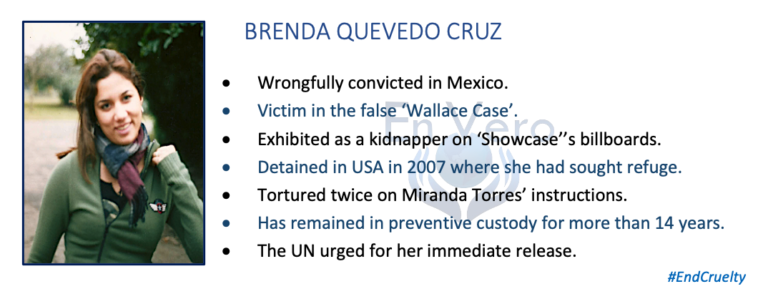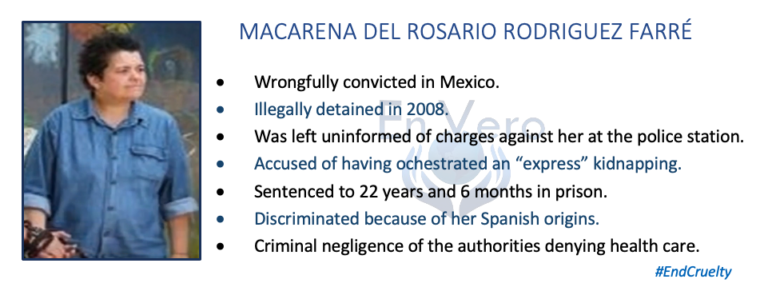Source: En Vero Spanish
Author: Inaudy Clavero
April 5, 2020 (Original publication in Spanish on January 20, 2020)
Translation: Omar Noori. Review: J. Bravo
Opinion: The case of Dr. Waldo Orlando García Ferrera and the reality of Mexico’s “transitional” justice system
For all those who know me and for those who, by being my virtual friends, have come into my life through references and with whom for years we have been able to exchange opinions on different topics, I would like you to wholeheartedly take a little time to read about this bitter experience in which any of you could be the victim of a cruel fate, whether or not you are in the wrong place.
I believe there are two very difficult things to deal with, assimilate and solve in this life. The first one is that when you have a terminal illness and know what ending awaits you (an end that we will all have but that we find difficult to accept), you might say to yourself, “my time has come; either I fight for my life or I give up.” When you say “I fight for my life,” you embrace not only the medical treatment and the care that your illness requires, but you also try to see life in a different light: to love each and every thing, enjoy each and every thing that you were not even were aware of before, make yourself and others full of life “before your light goes out,” as the great singer-songwriter Facundo Cabral said. If you are successful, you will be more humble and happier and if you are not, you will free yourself from the illness, pain and anguish, and as far as I know, “you will leave in peace.”
The second situation that can throw us into the unknown is the limitation of freedom. In this particular case I am talking about the limitation of human freedom in fact and in law. I am not only classifying freedom in its broadest context as living with dignity. No, friends. I am also referring to situations where they take it away from you, when your life is unfairly changed, when without just cause and without anything incriminating you directly and justifiably they imprison you for years and accuse you of a crime you did not commit. Then, at that moment, your courage grows. Your helplessness and anger are mixed in a set of emotions that, believe it or not, are the ones that keep you alive, alert in the fight to show everyone that you are innocent, when in fact those who must prove you guilty have no arguments and don’t know how to do it.
This reality that seems to repeat itself, not only in the case of Dr. Ferrera, but also in many more cases in Mexico, without mattering to any administration because unfortunately the nightmare does not end, is the sad, frustrating and actual case of Cuban doctor Waldo Orlando García Ferrera, deprived of his freedom since 2011.
Everyone who knows him asks me: How is he is in jail when there is no evidence incriminating him? When is the trial? And how will he be convicted without any real scientific evidence involving him?
I will answer them by trying to use a plain and simple language so that anyone can understand.
He is imprisoned without any evidence incriminating him because in Mexico culprits are fabricated: a false narrative is assembled, a fictional story with no scientific support. The only tacit or explicit element that makes up a criminal investigation are many written words included in a legal file with a case number, a dreadful and incongruous narrative, an endless number of pages that the judges will not read, but which by mutual agreement with the Public Prosecutor’s Office will guide this body or institution to give legal form to the story told, so as to make it sound credible. The evidentiary, objective, real and scientific element as burden of proof will always be non-existent on the scales of justice due to the deficient investigative stage, so the judge will always favour any subjective element to convict the alleged responsible person who was chosen and thus will turn the poorly developed circumstantial evidence into burden of proof because the prosecution simply has nothing else to incriminate the accused with.
Through the completely deficient and circumstantial evidence, it is intended to convict an innocent person, regardless of how the events actually took place, without taking into account the scientific evidence that does exist in favour of the Cuban doctor, without taking into account the witness statements and by ignoring the objective and clear intention of the authorities to involve the doctor, using physical and psychological torture to force him to plead guilty.” That is what is called “Justice Mexican style.”
When is the trial?
Unfortunately, the Mexican legal system is in constant transformation. Until about three years ago, in the state where the doctor is kept prisoner, there were no courtrooms, so writings replaced all legal action in the eyes of the judges. That is recognized as the old criminal system, under which justice continues to be administered in some cases, without yet reflecting equity in criminal procedure under this legal order. Thus, although the courtrooms have already been set up, Dr. Ferrera will have to continue his process as stipulated under the old system. It means that… the Cuban doctor will never have a trial, and for those who do not know how justice Mexican style works, the so-called hearings only exist within the legal framework.
When the judge sets a hearing, the parties appear before the corresponding criminal court clerk to sign an act of mutual agreement and with this the closing of the case. Within the period determined by the judge (and not within the term stipulated by law) the corresponding sentence will be issued. The thicker the file is, the longer the judge, who never reads the files and is never in a hurry, will take. It doesn’t matter if it is a one-year or a five-year wait. In addition, often, when the hearing is scheduled, you only find the files on a table with an agreement to sign and nothing else; there is nothing to say, no one to talk to and nothing to do. Many times not even the introverted silhouette of a court clerk is there and, of course, the judge is never there: that is the hearing, Mexican style.
That’s the way things are done in Mexico, my dear friends. The oral discourse as the guiding principle of the accusatory criminal trial is not for everyone the same, despite the fact that the oral discourse determines the condition of existence of the immediacy principle both in the procedural phase and in the assessment of the evidence, for it is not possible to challenge the content or intention of any statement.
How are they going to convict him without any scientific evidence incriminating him?
Because, in Mexico, it doesn’t matter whether you’re guilty or innocent; it only matters to have a culprit behind bars, for someone to pay. It becomes easier to assemble the narrative around a person that, according to their personal profile, you can create a plot for the fictional script of a story, depending on whether in one way or another they had a good or bad relationship with the alleged victim, so as to make it sound credible. Thus the story of “a crime of passion” always comes in handy… As they say in my hometown: “You goose is cooked,” and you can only save yourself in one of three ways: either you are a friend of an influential politician; you are family or a friend of an influential and reckless drug trafficker; or you have a lot of money to bribe judges and prosecutors…
I leave you right now, but not before telling you that I have a good story, with evidence of each detail and violation of this dramatic and sad reality, hoping that in the not-too-distant future you will read it in my book because it will be the mother of all the bombshells…




